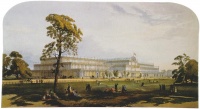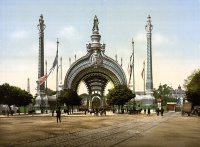World's fair
From The Art and Popular Culture Encyclopedia
|
"World exhibitions were places of pilgrimage to the fetish commodity." "If the commodity was a fetish, then Grandville was the tribal sorcerer". --Arcades Project (1927-1940) by Walter Benjamin |

|
Related e |
|
Featured: |
Expo (also known as otherwise World Fair and World's Fair) is the name of various large public exhibitions held since the mid-19th century. The official sanctioning body is the Bureau International des Expositions (BIE), translated in English as the International Exhibitions Bureau (though sometimes rendered as the Bureau of International Expositions). BIE-approved fairs are divided into a number of types: universal, and international or specialized. They usually last between 3 and 6 months. In addition, countries can hold their own 'fair', 'exposition', or 'exhibition', without BIE endorsement.
The first Expo was held in The Crystal Palace in Hyde Park, London, in 1851 under the title “Great Exhibition of the Works of Industry of All Nations”.
Examples
- 1851 - London, England - Great Exhibition of the Works of Industry of All Nations
- 1889 - Paris, France - Exposition Universelle (1889) - Eiffel Tower
- 1925 - Paris, France - Exposition Internationale des Arts Décoratifs et Industriels Modernes
- Expo '58
Registered Expositions ("Universal Expositions")
Universal Expositions encompass universal themes that affect the full gamut of human experience. These Universal Expos usually have themes based on which pavilions are made to represent the country's opinion on that theme. The theme for the 2005 Expo in Japan was "nature's wisdom". Universal expositions are usually held less frequently than specialized or international expositions because they are more expensive. To distinguish them from lesser fairs, they require total design of pavilion buildings from the ground up. As a result, nations compete for the most outstanding or memorable structure—recent examples include Japan, France, Morocco & Spain at Expo '92. Recent Universal Expositions include Brussels Expo '58, Seattle Expo '62, known as the Century 21 Exposition, Montreal Expo 67, San Antonio HemisFair '68, Osaka Expo '70,Spokane Expo '74, Knoxville, Tennessee Expo '82, New Orleans Expo '84, Vancouver Expo '86, Brisbane Expo '88, Osaka, Japan Expo '90, Seville Expo '92, Lisbon Expo '98 and Hanover Expo 2000. The Expo 2005 was held at Aichi Prefecture, Japan. Sometimes pre-fabricated structures are also used to minimize costs for developing countries or for countries from a geographical block to share space (i.e. Plaza of the Americas at Seville '92).
The only Universal exposition to be held without BIE approval was the 1964/1965 New York World's Fair. Because that Fair did not comply with BIE rules in place at the time, the sanctioning organization denied the Fair an "official" status. The Fair proceeded without BIE approval and turned to tourism and trade organizations to host national pavilions in lieu of official government sponsorship.
The United States, Japan, Canada, Spain, Belgium, and Australia have hosted the World's Fair in more than one city in different years.
BIE has moved to sanction expos only every five years, starting with the 21st century; with the 1980s and 1990s overflowing with expos back to back, some see this as a means to cut down potential expenditure by participating nations.
The rule may apply to all expos, or it may end up that Universal expositions will be restricted to every five years or so, with International or Specialized expositions in the in-between years for countries wishing to celebrate a special event.
List of hitherto official world expositions according to the Bureau International des Expositions (BIE)and ExpoMuseum:
- 1851 London (United Kingdom)
- 1855 Paris (France)
- 1862 London (United Kingdom)
- 1867 Paris (France)
- 1873 Vienna (Austria)
- 1876 Philadelphia (United States)
- 1878 Paris (France)
- 1880 Melbourne (Australia)
- 1884 New Orleans (United States)
- 1888 Barcelona (Spain)
- 1889 Paris (France)
- 1893 Chicago (United States)
- 1896 Budapest (Hungary)
- 1897 Brussels and Stockholm (Sweden)
- 1900 Paris (France)
- 1901 Charleston (United States)
- 1904 St. Louis (United States)
- 1905 Liège (Belgium)
- 1906 Milan (Italy)
- 1910 Brussels (Belgium)
- 1911 Turin (Italy)
- 1913 Ghent (Belgium)
- 1914 Lyon (France)
- 1915 San Francisco (United States)
- 1915 San Diego (United States)
- 1929 Barcelona (Spain)
- 1933 Chicago (United States)
- 1937 Paris (France)
- 1939 New York City (United States)
- 1939-1940 San Francisco (United States)
- 1958 Brussels (Belgium)
- 1960 Seattle (United States)
- 1962 Seattle (United States)
- 1964 New York (United States)
- 1967 Montreal (Canada)
- 1968 San Antonio (United States)
- 1970 Osaka (Japan)
- 1974 Spokane (United States)
- 1982 Knoxville (United States)
- 1984 New Orleans (United States)
- 1985 Tsukuba (Japan)
- 1986 Vancouver (Canada)
- 1988 Brisbane (Australia)
- 1990 Osaka (Japan)
- 1992 Seville (Spain)
- 1993 Daejeon (South Korea)
- 1998 Lisbon (Portugal)
- 2000 Hanover (Germany)
- 2005 Aichi (Japan)
- 2008 Zaragoza (Spain)
- 2010 Shanghai (China)
- 2012 Yeosu (South Korea)
See also

.jpg)

